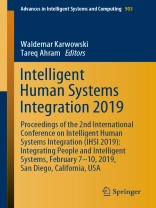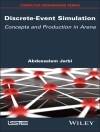This book presents cutting-edge research on innovative human systems integration and human–machine interaction, with an emphasis on artificial intelligence and automation, as well as computational modeling and simulation. It covers a wide range of applications in the area of design, construction and operation of products, systems and services, including lifecycle development and human–technology interaction. The book describes advanced methodologies and tools for evaluating and improving interface usability, new models, and case studies and best practices in virtual, augmented and mixed reality systems, with a special focus on dynamic environments. It also discusses various factors concerning the human user, hardware, and artificial intelligence software.
Based on the proceedings of the 2nd International Conference on Intelligent Human Systems Integration (IHSI 2019), held on February 7–10, 2019, in San Diego, California, USA, the book also examines the forces that are currently shaping the nature of computing and cognitive systems, such as the need to reduce hardware costs; the importance of infusing intelligence and automation; the trend toward hardware miniaturization and power reduction; the need for a better assimilation of computation in the environment; and social concerns regarding access to computers and systems for people with special needs. It offers a timely survey and a practice-oriented reference guide for policy- and decision-makers, human factors engineers, systems developers and users alike.
Table of Content
Context Awareness Computing in Smart Spaces Using Stochastic Analysis of Sensor Data.- Hexagonal Image Generation by Virtual Multi-Grid-Camera.- The Effects of Culture on Authentication Cognitive Dimensions.- Out of Position Driver Monitoring from Seat Pressure in Dynamic Maneuvers.- Design Methodology for Flight Deck Layout of Civil Transport Aircraft.- Assessing Social Driving Behavior.- Research on Product Color Design under the Cognition of Brand Image.- Human Resource Development Opportunities in Latvian Health Care Organization.- Smart Home Technology as a Creator of a Super-Empowered User.- Adaptive Learning for Robots in Public Spaces.- Code of Breakthrough Innovations.- The Construction of Agent Simulations of Human Behavior.- Personalized Product Recommendation for Interactive Media.- Exploring the Acceptance of Video-Based Medical Support.- Cross-fertilization to Innovate the Guitar Design.- Crossing the Uncanny Valley of Human-System Teaming.- Enhancing Cursor Control Using Eye Movements.












